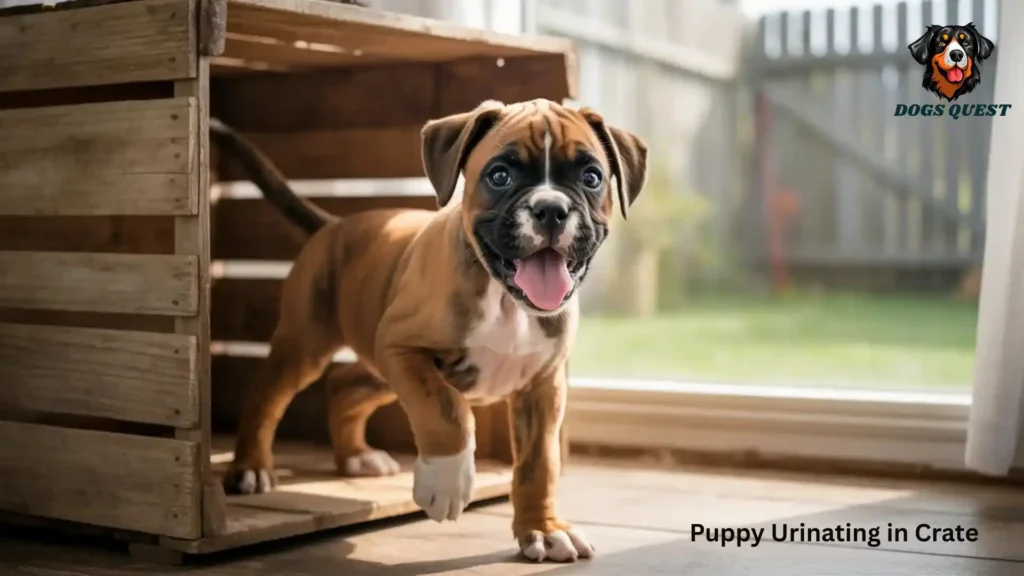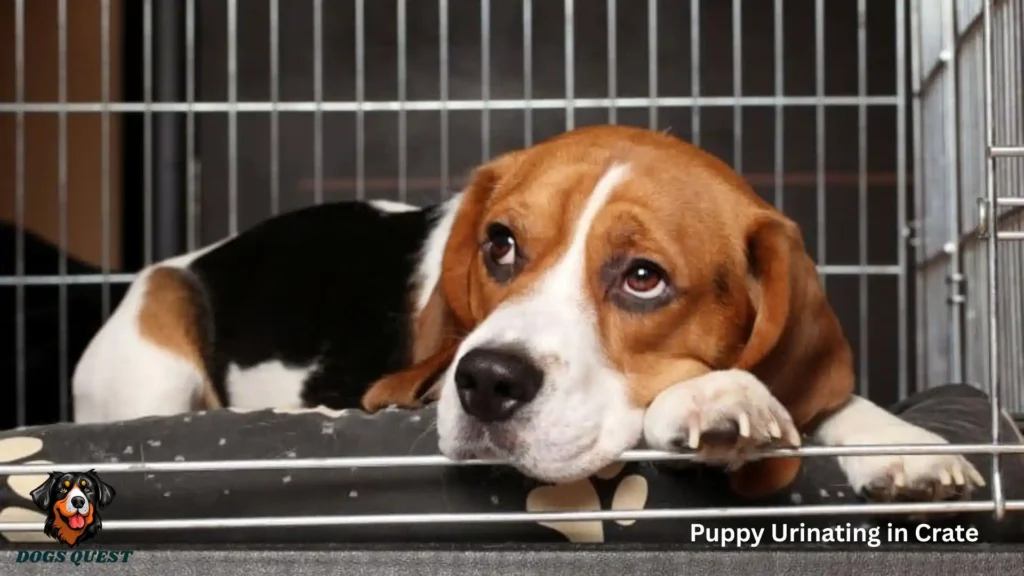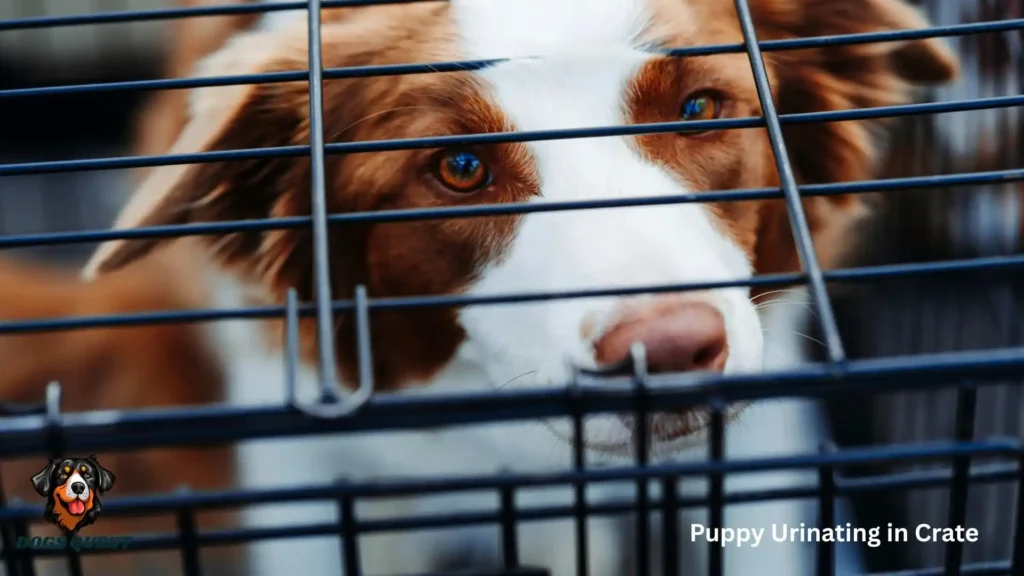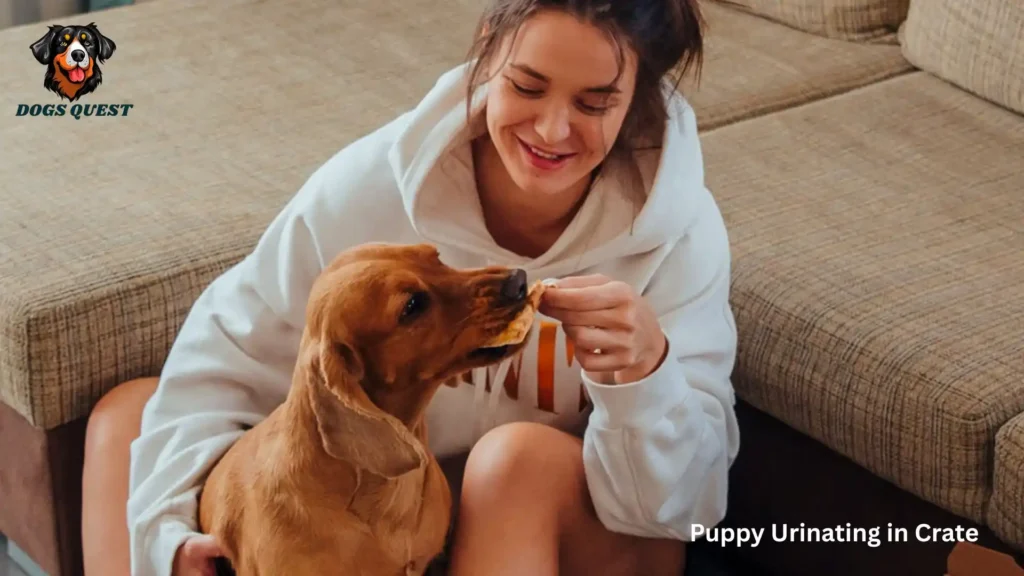Is your puppy urinating in crate and causing stress? Discover 11 powerful, vet-approved ways to stop your puppy from peeing in their crate. Learn causes, solutions, and expert tips for fast potty training success.
Introduction:
Bringing home a new puppy is an exciting experience — full of cuddles, playtime, and adorable moments. But what happens when your puppy urinating in crate becomes a constant issue? That unpleasant smell, the cleanup, and the confusion can make you wonder: Why is my puppy doing this? Don’t worry — you’re not alone. Many new dog owners face this exact challenge. The good news? With the right understanding, training methods, and consistency, you can fix the puppy urinating in crate problem faster than you think. In this detailed guide, we’ll explore everything from why puppies urinate in their crates to how to stop it effectively using proven techniques. By the end, you’ll have a happy, clean, and crate-trained puppy.
Understanding Why Your Puppy Is Urinating in the Crate

Before solving the problem, it’s essential to understand why your puppy urinating in crate is happening in the first place. Dogs are naturally clean animals; they don’t like to soil their sleeping areas. So, when they do, there’s always a reason.
1. The Crate Might Be Too Big
If your puppy has too much space inside the crate, they may choose one corner for sleeping and another for urinating. A properly sized crate allows your puppy to stand, turn around, and lie down comfortably, but not to create separate “bathroom zones.”
Tip: Use a crate divider to adjust the space as your puppy grows.
2. Your Puppy Isn’t Fully Potty-Trained Yet
A puppy urinating in crate can simply mean that the training isn’t complete. Puppies have tiny bladders and limited control. If you leave them too long in the crate, accidents are bound to happen.
👉 Rule of thumb: A puppy can generally hold their bladder for 1 hour per month of age, up to about 8 hours maximum for adult dogs.
3. Medical Reasons Can Cause Crate Accidents
Sometimes, puppy urinating in crate issues are caused by urinary tract infections (UTIs), bladder stones, or even stress-related medical conditions. If your pup is peeing frequently, crying, or licking their private area, contact your vet immediately. A quick checkup can rule out health issues.
4. Anxiety or Fear Triggers Crate Urination
Separation anxiety is a common reason for puppy urinating in crate. When left alone, some puppies become nervous and lose control of their bladder. Crate training should always be a positive experience, not a punishment.
11 Proven Ways to Stop Puppy Urinating in Crate

Now that you understand the causes, let’s move on to effective, science-backed solutions to stop your puppy urinating in crate problem quickly and humanely.
1. Choose the Right Crate Size
A correctly sized crate is your first defense. As mentioned earlier, the crate should be just big enough for comfort but not large enough for potty zones. If your crate is too big, use adjustable dividers or temporarily block off part of it.
2. Maintain a Consistent Potty Schedule
A consistent schedule is crucial to prevent puppy urinating in crate incidents. Take your puppy outside:
- First thing in the morning
- After every meal
- After naps
- Before bedtime
Reward them immediately when they pee outside. Puppies learn through repetition and positive reinforcement.
3. Use a Keyword Cue for Potty Time
Create a cue like “Go potty” or “Do your business.” Each time your puppy urinates outside, say the cue and reward them. Soon, your puppy will associate that phrase with the action — making it easier to control puppy urinating in crate behaviors.
4. Clean Crate Accidents Properly
If your puppy has an accident, it’s vital to clean it thoroughly using an enzymatic cleaner. Ordinary cleaners may leave behind scent traces that encourage repeat accidents. Eliminate the odor completely to discourage your puppy urinating in crate again.
5. Limit Water Before Bedtime
Reduce your puppy’s water intake 2 hours before bedtime — but don’t restrict it during the day. Puppies need plenty of hydration, but too much right before sleeping increases nighttime accidents. This helps reduce the puppy urinating in crate at night issue significantly.
6. Use Bedding Wisely
Soft bedding can absorb urine, and some puppies learn that peeing on it feels okay. Try using towels or thin crate pads during training. Once your puppy stops urinating in the crate, you can reintroduce soft bedding.
7. Avoid Leaving Your Puppy Too Long
A puppy urinating in crate can happen if you leave them for longer than they can hold their bladder. If you must be away, ask a friend, neighbor, or pet sitter to take your puppy outside mid-day. Remember — consistency prevents regression.
8. Rule Out Medical Issues Early
If the problem persists despite good training, always check for medical reasons. A vet can test for infections, diabetes, or bladder stones — all potential causes for puppy urinating in crate behavior.
9. Create Positive Crate Associations
The crate should be your puppy’s happy place. Feed them meals inside, give them treats, and keep their favorite toys there. Avoid using the crate for punishment — it increases fear and leads to more puppy urinating in crate issues due to anxiety.
10. Try Crate Pads with Odor Protection
High-quality, washable crate pads with odor and moisture barriers can help during training. These pads keep your crate clean and reduce stress while you correct puppy urinating in crate behavior.
11. Use Reward-Based Training Techniques
Whenever your puppy holds their bladder and urinates outside, reward them immediately. Treats, praise, and affection reinforce positive behavior far better than punishment. Over time, your puppy urinating in crate problem will disappear as they learn what earns them rewards.Contact Us
Preventing Future Accidents

Once your puppy learns not to urinate in the crate, it’s important to maintain that good behavior.
Gradual Freedom
Don’t rush to give your puppy full freedom around the house. Slowly expand their access to rooms as they prove their reliability.
Monitor Signs They Need to Go
Watch for pacing, whining, circling, or sniffing the ground — these are early signs your puppy needs a potty break. Catching these cues early prevents puppy urinating in crate recurrences.
Nighttime Crate Training for Puppies
Many new owners struggle with puppy urinating in crate at night. Nighttime training takes patience but can be made easier with structure.
Establish a Bedtime Routine
Take your puppy out right before bed. Keep nighttime potty trips calm — no play, no excitement. This teaches them nighttime is for sleeping, not playing.
Set Alarms During the First Weeks
During the first month, set an alarm every 3–4 hours for potty breaks. As your puppy grows, extend the time gradually. Consistency prevents puppy urinating in crate overnight habits from forming.
When to Seek Professional Help
If you’ve tried all these methods and your puppy urinating in crate problem continues, don’t panic. Sometimes, professional help is needed. Certified dog trainers and behaviorists can observe your puppy’s behavior and tailor a plan specifically for your pup. And if your vet confirms no medical issues, training adjustments are almost always successful.
Key Takeaways — Stop Puppy Urinating in Crate Fast

Let’s recap the main steps to end puppy urinating in crate issues once and for all:
- Use a properly sized crate.
- Stick to a consistent potty schedule.
- Reward good behavior immediately.
- Clean accidents with enzymatic cleaners.
- Rule out medical conditions early.
- Keep crate training positive.
- Avoid long confinement periods.
With patience and consistency, your puppy will quickly learn that the crate is for rest — not a restroom.
Final Thoughts
Dealing with puppy urinating in crate behavior can feel frustrating, but remember — it’s just a temporary stage in your puppy’s learning journey. Your patience, love, and proper training will pay off. Before long, your crate will stay dry, your puppy will stay confident, and you’ll both enjoy a cleaner, happier home. So take a deep breath — your pup is learning, and you’re doing great!
Frequently Asked Questions
Q1: Why does my puppy keep urinating in the crate even after going outside?
If your puppy urinating in crate continues after outdoor potty breaks, it might mean they didn’t fully empty their bladder, or they’re still associating the crate with anxiety. Always give them enough time outside and reward successful outdoor peeing.
Q2: Should I punish my puppy for urinating in the crate?
No. Punishing your puppy urinating in crate can create fear and worsen the issue. Instead, clean the accident calmly and focus on rewarding positive potty behavior outside the crate.
Q3: Can a medical issue cause crate accidents?
Yes. Health problems like urinary tract infections, bladder stones, or diabetes can lead to puppy urinating in crate frequently. Always consult your vet if the problem persists despite good training.
Q4: How long can my puppy hold their bladder?
Generally, a puppy can hold it for one hour per month of age — for example, a 3-month-old puppy can hold it for about 3 hours. Exceeding this limit can lead to puppy urinating in crate accidents.
Q5: How long does crate training take?
Crate training success varies, but with consistency, most puppies stop urinating in crate within 2 to 4 weeks. The key is patience, consistency, and positive reinforcement.

